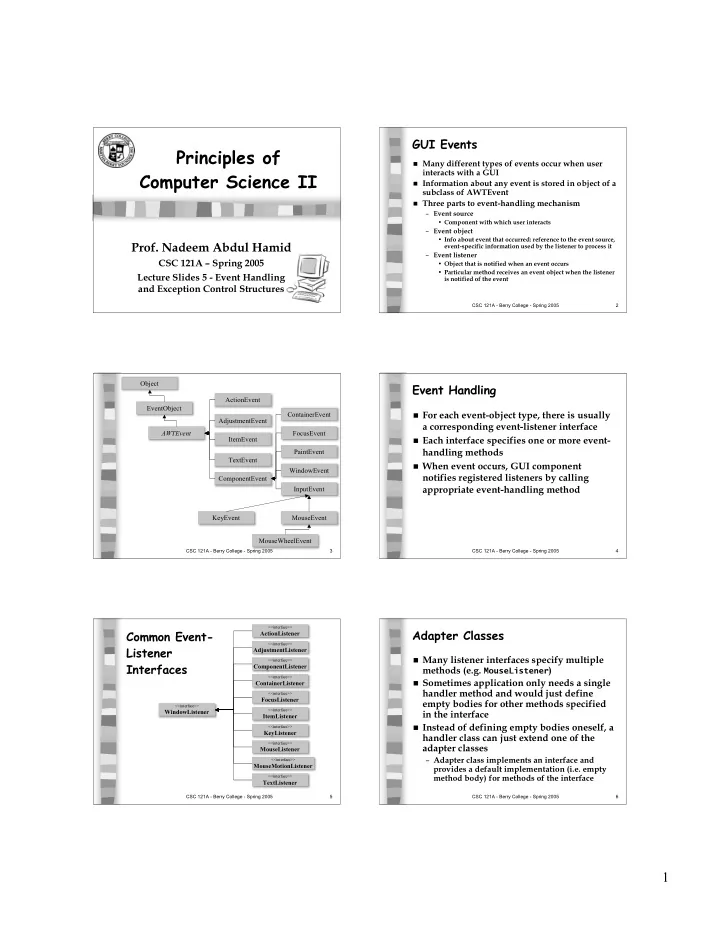

GUI Events Principles of Many different types of events occur when user interacts with a GUI Computer Science II Information about any event is stored in object of a subclass of AWTEvent Three parts to event-handling mechanism – Event source • Component with which user interacts – Event object • Info about event that occurred: reference to the event source, Prof. Nadeem Abdul Hamid event-specific information used by the listener to process it – Event listener CSC 121A – Spring 2005 • Object that is notified when an event occurs • Particular method receives an event object when the listener Lecture Slides 5 - Event Handling is notified of the event and Exception Control Structures CSC 121A - Berry College - Spring 2005 2 Object Event Handling ActionEvent EventObject For each event-object type, there is usually ContainerEvent AdjustmentEvent a corresponding event-listener interface AWTEvent FocusEvent Each interface specifies one or more event- ItemEvent handling methods PaintEvent TextEvent When event occurs, GUI component WindowEvent notifies registered listeners by calling ComponentEvent appropriate event-handling method InputEvent KeyEvent MouseEvent MouseWheelEvent CSC 121A - Berry College - Spring 2005 3 CSC 121A - Berry College - Spring 2005 4 <<interface>> Adapter Classes Common Event- ActionListener <<interface>> Listener AdjustmentListener Many listener interfaces specify multiple <<interface>> Interfaces ComponentListener methods (e.g. MouseListener ) <<interface>> Sometimes application only needs a single ContainerListener handler method and would just define <<interface>> FocusListener empty bodies for other methods specified <<interface>> <<interface>> WindowListener in the interface ItemListener Instead of defining empty bodies oneself, a <<interface>> KeyListener handler class can just extend one of the <<interface>> adapter classes MouseListener – Adapter class implements an interface and <<interface>> MouseMotionListener provides a default implementation (i.e. empty <<interface>> method body) for methods of the interface TextListener CSC 121A - Berry College - Spring 2005 5 CSC 121A - Berry College - Spring 2005 6 1
Subclassing JPanel for Mouse Adapter Classes and Interfaces Drawing ComponentAdapter ComponentListener Uses a JPanel as dedicated draw area ContainerAdapter ContainerListener Extends an adapter class for event handling FocusAdapter FocusListener KeyAdapter KeyListener MouseAdapter MouseListener lec05/Painter.java MouseMotionAdapter MouseMotionListener lec05/PaintPanel.java WindowAdapter WindowListener Example: lec05/MouseDetails.java lec05/MouseDetailFrame.java CSC 121A - Berry College - Spring 2005 7 CSC 121A - Berry College - Spring 2005 8 Key Event Handling Component Layout Key events generated when keys on Provided to arrange GUI components in a keyboard are pressed and released container for presentation KeyListener interface declares methods Three ways to arrange components – keyPressed – Absolute positioning: set layout to null , specify absolute position of each component w.r.t. – keyReleased upper-left corner of container – keyTyped – Layout managers: simpler and faster but not as – Each receives a KeyEvent object as argument much control over positioning Example: – Visual programming using IDE design tool – lec05/KeyDemo.java – lec05/KeyDemoFrame.java CSC 121A - Berry College - Spring 2005 9 CSC 121A - Berry College - Spring 2005 10 Layout Managers Complex Layouts Using JPanels FlowLayout A JPanel is a container and thus may have – Default for JPanel components, including other JPanels, added – Places components left-to-right in order they are to it added Create complex layouts using nested BorderLayout JPanels and layout managers – Default for JFrame and other windows – Arranges components in five areas: NORTH, SOUTH, EAST, WEST, CENTER Example – Limits container to having 5 components – lec05/PanelDemo.java GridLayout – lec05/PanelFrame.java – Arranges components in rows and columns CSC 121A - Berry College - Spring 2005 11 CSC 121A - Berry College - Spring 2005 12 2
Exception Handling Try-Catch Blocks Exception: indication of a problem during A try block encloses code that might throw an exception and code that should not execute if the program’s execution exception occurs Exception handling A catch block takes an exception parameter – Allows programmers to remove error-handling followed by code that catches (i.e. receives) and code from “main line” of program’s execution handles the exception – Enables writing robust and fault-tolerant – Executes only when an exception arises somewhere in the programs try block – At least one catch or finally block must immediately Exceptions surface from follow the try block – Explicitly mentioned code in a try block After exception is handled, control resumes after – Calls to other methods (may be deeply nested) the last catch block – Java Virtual Machine (JVM) as it executes Uncaught exceptions (i.e. with no matching catch block) cause the program to terminate Example: lec05/ExceptionTest.java CSC 121A - Berry College - Spring 2005 13 CSC 121A - Berry College - Spring 2005 14 Java Exception Hierarchy Types of Exceptions Object Unchecked – derived from Throwable RunTimeException Checked – must be caught by a method or else must be listed in a throws clause of the Error Exception method (e.g. IOException) Errors are liked unchecked exceptions RunTimeException LinkageError – Usually, should not be caught and do not ThreadDeath ArithmeticException require listing in a throws clause OutOfMemoryError NullPointerException ClassNotFoundException IOException CSC 121A - Berry College - Spring 2005 15 CSC 121A - Berry College - Spring 2005 16 Exception Example lec05/ExceptionTest2.java – Defining and throwing user-defined exceptions – Optional finally block: executed no matter what happens – Multiple catch blocks matching exception type CSC 121A - Berry College - Spring 2005 17 3
Recommend
More recommend